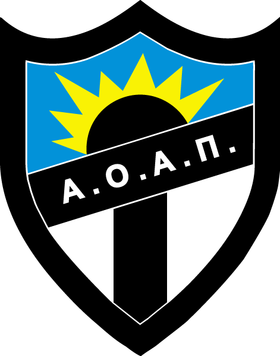| |||||
| Decades: | |||||
|---|---|---|---|---|---|
| See also: | Other events of 1973 List of years in Greece | ||||
The following lists events that happened during 1973 in Greece.
| |||||
| Decades: | |||||
|---|---|---|---|---|---|
| See also: | Other events of 1973 List of years in Greece | ||||
The following lists events that happened during 1973 in Greece.

Georgios Papadopoulos was a Greek military officer and dictator who led a coup d'etat in Greece in 1967 and became the country's Prime Minister from 1967 to 1973. He also was the President of Greece under the junta in 1973, following a referendum. However, after the effective suppression of the Athens Polytechnic uprising, he was, in turn, overthrown by hardliner Dimitrios Ioannidis, in a string of events that would culminate in the fall of the regime in 1974. His and the dictatorship's legacy, as well as its methods he constructed and effects on Greek economy and society as a whole, are still fiercely debated.

The president of Greece, officially the President of the Hellenic Republic, commonly referred to in Greek as the President of the Republic, is the head of state of Greece. The president is elected by the Hellenic Parliament; the role has been mainly ceremonial since the 1986 constitutional reform. The office was formally established by the Constitution of Greece in 1975, but has antecedents in the Second Hellenic Republic of 1924–1935 and the Greek junta in 1973–1974 which predated the transition to the current Third Hellenic Republic. The incumbent, since 13 March 2020, is Katerina Sakellaropoulou.

Georgios Zoitakis was a Hellenic Army General and regent of Greece from 13 December 1967 to 21 March 1972, during the military regime of the Colonels.

Spyridon "Spyros" Markezinis was a Greek politician, longtime member of the Hellenic Parliament, and briefly the Prime Minister of Greece during the aborted attempt at metapolitefsi (democratization) of the Greek military regime in 1973.

The Greek junta or Regime of the Colonels was a right-wing military junta that ruled Greece from 1967 to 1974. On 21 April 1967, a group of colonels overthrew the caretaker government a month before scheduled elections which Georgios Papandreou's Centre Union was favoured to win.

Diomidis Komninos, a Cypriot Greek high school student, was the first casualty of the Athens Polytechnic uprising. He was shot opposite the main gate of the Polytechnic.
The Metapolitefsi was a period in modern Greek history from the fall of the Ioannides military junta of 1973–74 to the transition period shortly after the 1974 legislative elections.
In the modern history of Greece, starting from the Greek War of Independence, the Constitution of 1975/1986/2001 is the last in a series of democratically adopted Constitutions.

The history of the Hellenic Republic constitutes three republican periods in the modern history of Greece: from 1822 until 1832; from 1924 until 1935; and from 1974 through to the present. See also the constitutional history of Greece.
Stylianos G. Pattakos was a Greek military officer. Pattakos was one of the principals of the Greek military junta of 1967–1974 that overthrew the government of Panagiotis Kanellopoulos in a coup d'état on 21 April 1967.

Spyridon-Adonis Georgiadis, commonly known as Adonis Georgiadis, is a Greek politician, author, publisher and former telemarketer. Often described as being on the far right of the political spectrum, he currently serves as Vice President of New Democracy and Minister for Health in the Second Cabinet of Kyriakos Mitsotakis.

A constitutional referendum was held in Greece on 29 July 1973. The amendments would confirm the abolition of the monarchy by the military junta and establish a republic. The proposal was approved by 78.6% of voters with a turnout of 75%.

Agia Paraskevi Football Club, unofficially known as Santa is a Greek association football club based in the city of Athens, Greece. Their home ground facilities are based in "Notou Street" at Agia Paraskevi of Athens, Greece. The club also has basketball, volleyball and futsal departments.

The Greek junta trials were the court trials involving members of the military junta that ruled Greece from 21 April 1967 to 23 July 1974. These trials involved the instigators of the 21 April coup d'état, as well as other junta members of various ranks who took part in the events of the Athens Polytechnic uprising and in the torture of citizens.

The Athens Polytechnic uprising occurred in November 1973 as a massive student demonstration of popular rejection of the Greek military junta of 1967–1974. It began on 14 November 1973, escalated to an open anti-junta revolt, and ended in bloodshed in the early morning of 17 November after a series of events starting with a tank crashing through the gates of the Athens Polytechnic.
Greek Unity is a minor Greek nationalist political party.
Dimitrios Papadopoulos was a Hellenic Army officer who reached the rank of Lieutenant General. He is most notable for his leadership in the Greco-Italian War of 1940–41.
The Greek Constitution of 1973 was an amended version of the Greek Constitution of 1968 by Greek dictator Georgios Papadopoulos, with the aim of abolishing the Greek monarchy. Papadopoulos's rewrite of the 1968 constitution replaced the terms "parliamentary monarchy" and "king" with "republican democracy" and "president of Greece". The constitution was enacted as part of Papadopoulos's failed attempt at liberalisation of his regime, but, like its 1968 predecessor, never fully implemented.
The Athens General State Hospital "Georgios Gennimatas" founded in 1958 under the name Uniform General Hospital of Athens is a Greek nursing institution based in Athens at 154 Mesogeion Avenue.
![]() Media related to 1973 in Greece at Wikimedia Commons
Media related to 1973 in Greece at Wikimedia Commons